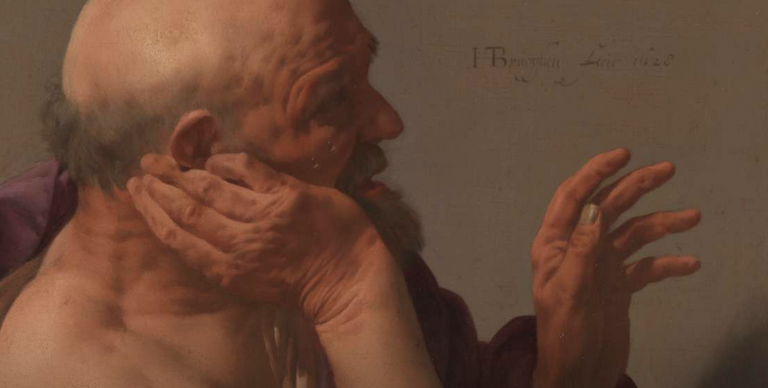
Heraclitus, Hendrick ter Brugghen, 1628 (Rijksmuseum)
Heraclitus, called “ the dark” one by the ancients showed us the constant and perpetual change; for no two seconds together is a thing ever same (LCL). There is no pause in a change; it is continuum as is time, rivers, we. All things are ever-passing into something else.
Having so little of his work preserved, the interpretations of the fragments from Heraclitus differ drastically according to the one who interprets them (see, e.g. Lassalle, Teichmüller, Pfleiderer). Still, the little we know occasionally feels so familiar, even if we are separated from Heraclitus’s world by a span of more than two and half thousand years.
As I enrol on a journey of learning about this fascinating ancient philosopher, I will share some of his fragments with you.
Οὐκ ἐμεῦ ἀλλὰ τοῦ λόγου ἀκούσαντας ὁμολογέειν σοφόν ἐστι, ἓν πάντα εἶναι.
It is wise to listen, not to me but to the Reason/Word, and to confess that all things are one.
Ἀξύνετοι ἀκούσαντες κωφοῖσι ἐοίκασι· φάτις αὐτοῖσι μαρτυρέει παρεόντας ἀπεῖναι.
The stupid when they have heard are like the deaf; of them does the proverb bear witness that when present they are absent.
Ἓν τὸ σοφόν, ἐπίστασθαι γνώμην ᾗ κυβερνᾶται πάντα διὰ πάντων.
Wisdom is one thing—to know the thought whereby all things are steered through all things. (That is, to understand the doctrine of opposites and of perpetual change).
Used Abbreviations:
LCL — Loeb Classical Library (Harvard University Press)
RESOURCES AND TRANSLATION:
Hippocrates, Heracleitus. Nature of Man. Regimen in Health. Humours. Aphorisms. Regimen 1-3. Dreams. Heracleitus: On the Universe. Translated by W. H. S. Jones. Loeb Classical Library 150. Cambridge, MA: Harvard University Press, 1931.
More on Heraclitus:
Patrick, G. T. W, The Fragments of the Work of Heraclitus of Ephesus on Nature, Baltimore, 1889: https://ia800304.us.archive.org/27/items/thefragmentsofth00herauoft/thefragmentsofth00herauoft.pdf